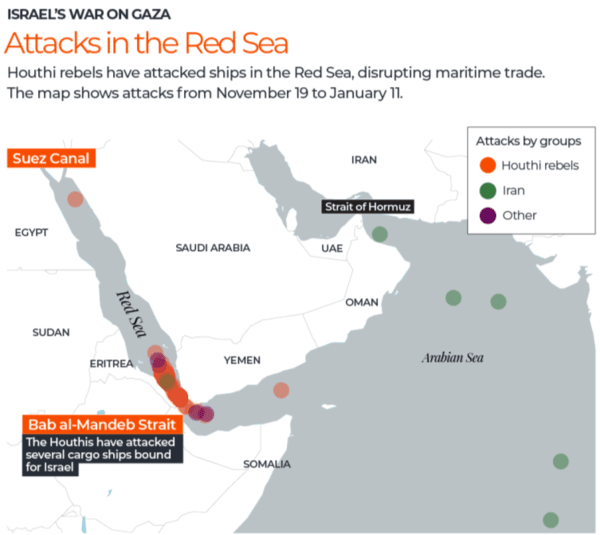The Death of Hamas Leader Yahya Sinwar: What We Know So Far
Israel and the US claim intelligence provided Sinwar’s whereabouts, but this is doubtful.
Loading...
The Houthis have been engaged in a decade-long civil war and say their attacks are incompatible with Israel's war on Gaza. After weeks of Houthi attacks on shipping in the Red Sea, the United States and Britain launched a military offensive against Yemen that the Houthis described as "barbaric."
The Houthis, an Iran-linked group based in Yemen, claimed their attacks were a response to Israel's bombardment of the Gaza Strip and the failure of the international community to stop it. The Houthis have mostly targeted Israeli-owned shipping, and in December the United States formed a multilateral coalition to protect commercial shipping from attack. The force currently consists of more than 20 countries, according to the Pentagon. So who are the Yemeni fighters at the center of this conflict?
Who are the Houthis? The Houthis, also known as Ansar Allah (supporters of God), are an armed group that controls most of Yemen, including the capital Sanaa, and some western and northern regions near Saudi Arabia.
The Houthi rebels emerged in the 1990s but rose to prominence in 2014 when they revolted against the Yemeni government, leading to its resignation and a severe humanitarian crisis. The group then fought for years against a Saudi-led military coalition backed by Iran. The two warring parties have made several efforts to hold peace talks. But experts say Shiite groups should not be seen as proxies for Iran. It has its own base, interests, and ambitions. What is the situation in the civil war in Yemen?
Yemen has been in a 10-year civil war, and the Houthi rebels control most of the country. The group is negotiating a ceasefire with Saudi Arabia, and Yemen's official government is based in Aden and led by President Rashad al-Alimi.
Al-Alimi came to power in 2022 after exiled President Abd-Rabbu Mansour Hadi handed over power to him. Relations between Hadi and the Houthis have been particularly strained.
Yemen's civil war plunged the country into what the United Nations called "the world's worst humanitarian crisis" in March 2023. According to the United Nations, about 21.6 million people, or two-thirds of Yemen's population, "are in urgent need of humanitarian assistance and protection."
But fighting between the Houthi rebels and their military coalition has largely subsided over the past year. In 2023, Yemeni rebels and government forces exchanged about 800 prisoners over the course of three days.
The Houthis are in talks with Saudi officials in Oman to negotiate a permanent ceasefire. Saudi Arabia also restored ties with Iran in 2023 in hopes of a peace process in Yemen.
Why are the Houthis attacking ships in the Red Sea? The Houthis have said the main objective of the attacks on commercial and military ships with potential ties to Israel is to pressure Tel Aviv to end the war in Gaza. On November 18, a cargo ship called the Galaxy Leader was acquired and turned into a tourist attraction for Yemenis. "I stressed to everyone that the Houthi operation is aimed at supporting the Palestinian people in Gaza and that it cannot withstand attacks and sieges," Mohammed Abdulsalam, the Houthi rebels' chief negotiator and spokesman, told the Voice. Urdu in December.
The Houthis also said Thursday they would continue to attack ships linked to Israel after the US and Britain struck Yemen. "Yemen's suspension of aid to Palestine and Gaza is wrong," Abdulsalam wrote online. "The group's attacks will continue to impact Israeli ships and ships bound for occupied Palestinian ports," he wrote. The group also called on Israel to allow humanitarian aid into Gaza.
But experts said the attack could help the Houthis in other ways as well. In Yemen, staff numbers have increased dramatically due to public support for the people of Gaza. Attacks and responses by major powers such as the United States force other countries and governments to negotiate with them, effectively giving them legitimacy in a situation where they are not officially recognized internationally as the Yemeni government. The Red Sea and Suez Canal account for 30 percent of global container traffic, and since the attacks began, several shipping companies have said they will reroute ships through Africa.
Will the latest escalation affect Yemen's fragile peace? Experts say Houthi attacks on ships in the Red Sea could threaten peace in Yemen. Especially since the ceasefire talks seem to be gaining momentum after a decade of war.
The United Nations announced significant progress in the talks in late December, but experts warned that the Houthis' actions in the Red Sea could undermine the final agreement. They explained that the attack could trigger a US military response that could "undermine the fragile terms of the treaty".
Some analysts also worry that the Houthis may be tempted to use the increased numbers from the recruitment surge to expand their ambitions. In recent weeks, the Houthis have deployed 50,000 troops around the city of Marib, the last bastion of Yemen's internationally recognized government.
But other experts say the Houthis could maintain closer ties with Saudi Arabia, which could prevent them from taking steps to escalate tensions in Yemen.

Editor
Israel and the US claim intelligence provided Sinwar’s whereabouts, but this is doubtful.
Tata, who passed away on Wednesday, was known for his humility and his expansive vision.
Israel says the major attacks that levelled multiple residential buildings in southern Beirut targeted Hezbollah’s ‘central command’.
